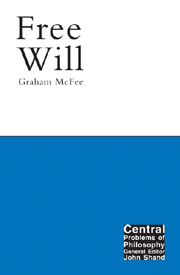Book contents
- Frontmatter
- Contents
- Preface and acknowledgements
- 1 Free will: the issue
- 2 Determinism: exposition
- 3 Determinism: qualifications and clarifications
- 4 Libertarianism: two varieties
- 5 Compatibilism I: the “utilitarian” position
- 6 Compatibilism II: the two-language view
- 7 The irrelevance of determinism
- 8 The very idea of causal necessity
- 9 Conclusions and reflections on philosophical method
- Appendix: chaos theory and determinism
- Notes
- A guide to further reading
- Bibliography
- Index
9 - Conclusions and reflections on philosophical method
- Frontmatter
- Contents
- Preface and acknowledgements
- 1 Free will: the issue
- 2 Determinism: exposition
- 3 Determinism: qualifications and clarifications
- 4 Libertarianism: two varieties
- 5 Compatibilism I: the “utilitarian” position
- 6 Compatibilism II: the two-language view
- 7 The irrelevance of determinism
- 8 The very idea of causal necessity
- 9 Conclusions and reflections on philosophical method
- Appendix: chaos theory and determinism
- Notes
- A guide to further reading
- Bibliography
- Index
Summary
The argument of the book is now complete. We have explored a number of traditional options concerning free action (that is, canvassed alternatives to determinism) having first set out a determinist argument as a way of posing the issue. In passing, the philosophical strategies of argument have been highlighted. In both these ways, then, this text is a suitable “beginners' guide” to philosophical investigations of this traditional topic.
I have put forward a “solution” (better, a dissolution) of the problem. Here I tie up some loose ends by commenting both on that solution and on the strategy of the book (p. 139), saying a little more, of a general kind, about the nature of that “solution” (p. 137) and discussing briefly its location in the frame of free will defences (p. 139). It also includes a remark on an issue not taken as central here, although regularly discussed in books on the freedom of the will: the idea of control (p. 148).
Context-sensitivity and explanation
It is worth stressing the contextual weight of my “answer”: my free will defence relies on contrasting “utterances” in terms of their occasion-sensitive features. When we assume both the applicability of ceteris paribus clauses and the applicability of causal explanation, the determinist conclusion is warranted. And this is our position when doing natural science. But we are not so disposed, nor should we be, in respect of human behaviour (even viewed as movement).
- Type
- Chapter
- Information
- Free Will , pp. 137 - 154Publisher: Acumen PublishingPrint publication year: 2000

